典故性成语的来源于翻译
- 格式:doc
- 大小:38.50 KB
- 文档页数:4
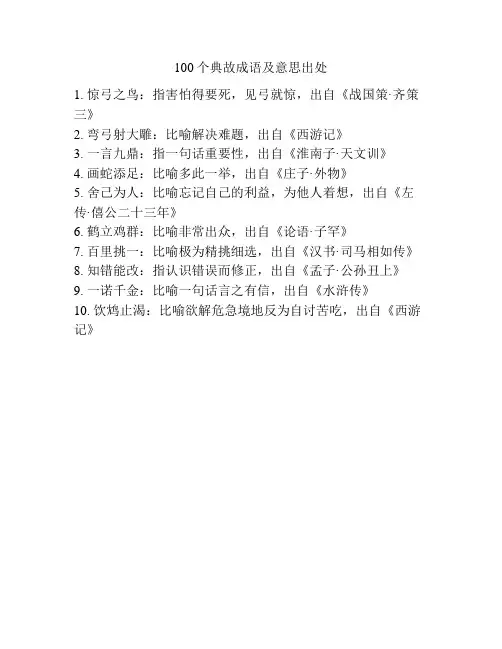
100个典故成语及意思出处
1. 惊弓之鸟:指害怕得要死,见弓就惊,出自《战国策·齐策三》
2. 弯弓射大雕:比喻解决难题,出自《西游记》
3. 一言九鼎:指一句话重要性,出自《淮南子·天文训》
4. 画蛇添足:比喻多此一举,出自《庄子·外物》
5. 舍己为人:比喻忘记自己的利益,为他人着想,出自《左传·僖公二十三年》
6. 鹤立鸡群:比喻非常出众,出自《论语·子罕》
7. 百里挑一:比喻极为精挑细选,出自《汉书·司马相如传》
8. 知错能改:指认识错误而修正,出自《孟子·公孙丑上》
9. 一诺千金:比喻一句话言之有信,出自《水浒传》
10. 饮鸩止渴:比喻欲解危急境地反为自讨苦吃,出自《西游记》。
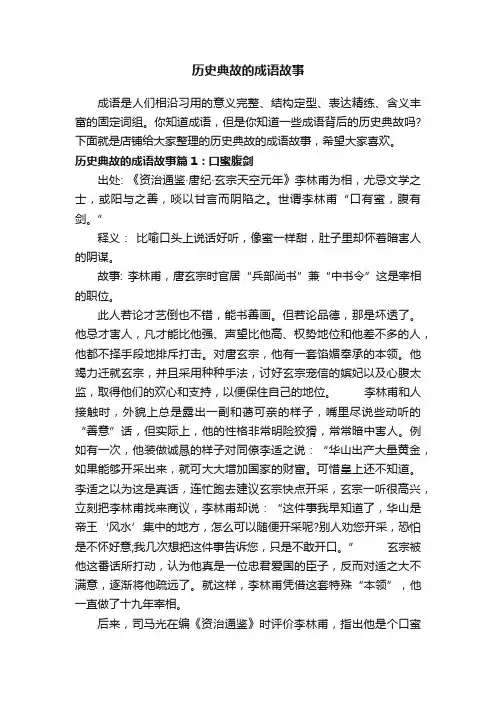
历史典故的成语故事成语是人们相沿习用的意义完整、结构定型、表达精练、含义丰富的固定词组。
你知道成语,但是你知道一些成语背后的历史典故吗?下面就是店铺给大家整理的历史典故的成语故事,希望大家喜欢。
历史典故的成语故事篇1:口蜜腹剑出处: 《资治通鉴·唐纪·玄宗天空元年》李林甫为相,尤忌文学之士,或阳与之善,啖以甘言而阴陷之。
世谓李林甫“口有蜜,腹有剑。
”释义:比喻口头上说话好听,像蜜一样甜,肚子里却怀着暗害人的阴谋。
故事: 李林甫,唐玄宗时官居“兵部尚书”兼“中书令”这是宰相的职位。
此人若论才艺倒也不错,能书善画。
但若论品德,那是坏透了。
他忌才害人,凡才能比他强、声望比他高、权势地位和他差不多的人,他都不择手段地排斥打击。
对唐玄宗,他有一套馅媚奉承的本领。
他竭力迁就玄宗,并且采用种种手法,讨好玄宗宠信的嫔妃以及心腹太监,取得他们的欢心和支持,以便保住自己的地位。
李林甫和人接触时,外貌上总是露出一副和蔼可亲的样子,嘴里尽说些动听的“善意”话,但实际上,他的性格非常明险狡猾,常常暗中害人。
例如有一次,他装做诚恳的样子对同僚李适之说:“华山出产大量黄金,如果能够开采出来,就可大大增加国家的财富。
可惜皇上还不知道。
李适之以为这是真话,连忙跑去建议玄宗快点开采,玄宗一听很高兴,立刻把李林甫找来商议,李林甫却说:“这件事我早知道了,华山是帝王‘风水’集中的地方,怎么可以随便开采呢?别人劝您开采,恐怕是不怀好意;我几次想把这件事告诉您,只是不敢开口。
”玄宗被他这番话所打动,认为他真是一位忠君爱国的臣子,反而对适之大不满意,逐渐将他疏远了。
就这样,李林甫凭借这套特殊“本领”,他一直做了十九年宰相。
后来,司马光在编《资治通鉴》时评价李林甫,指出他是个口蜜腹剑的人,这是很符合实际的.历史典故的成语故事篇2:破釜沉舟秦朝末年,各地人民纷纷举行起义,反抗秦朝的暴虐统治。
农民起义军的领袖,最著名的是陈胜、吴广,接着有项羽和刘邦。
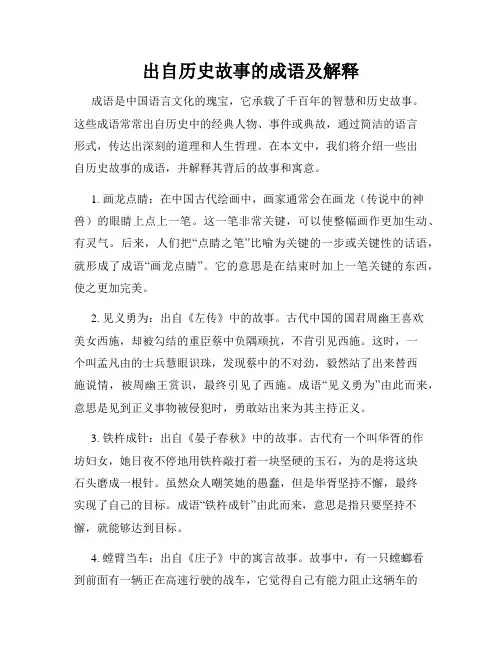
出自历史故事的成语及解释成语是中国语言文化的瑰宝,它承载了千百年的智慧和历史故事。
这些成语常常出自历史中的经典人物、事件或典故,通过简洁的语言形式,传达出深刻的道理和人生哲理。
在本文中,我们将介绍一些出自历史故事的成语,并解释其背后的故事和寓意。
1. 画龙点睛:在中国古代绘画中,画家通常会在画龙(传说中的神兽)的眼睛上点上一笔。
这一笔非常关键,可以使整幅画作更加生动、有灵气。
后来,人们把“点睛之笔”比喻为关键的一步或关键性的话语,就形成了成语“画龙点睛”。
它的意思是在结束时加上一笔关键的东西,使之更加完美。
2. 见义勇为:出自《左传》中的故事。
古代中国的国君周幽王喜欢美女西施,却被勾结的重臣蔡中负隅顽抗,不肯引见西施。
这时,一个叫孟凡由的士兵慧眼识珠,发现蔡中的不对劲,毅然站了出来替西施说情,被周幽王赏识,最终引见了西施。
成语“见义勇为”由此而来,意思是见到正义事物被侵犯时,勇敢站出来为其主持正义。
3. 铁杵成针:出自《晏子春秋》中的故事。
古代有一个叫华胥的作坊妇女,她日夜不停地用铁杵敲打着一块坚硬的玉石,为的是将这块石头磨成一根针。
虽然众人嘲笑她的愚蠢,但是华胥坚持不懈,最终实现了自己的目标。
成语“铁杵成针”由此而来,意思是指只要坚持不懈,就能够达到目标。
4. 螳臂当车:出自《庄子》中的寓言故事。
故事中,有一只螳螂看到前面有一辆正在高速行驶的战车,它觉得自己有能力阻止这辆车的前进,于是伸出了自己的臂膀去阻挡车轮。
最后,当然是不幸以失败而告终。
成语“螳臂当车”由此而来,意思是指力量微不足道而自不量力。
5. 力不从心:古代有一个叫白起的将军,他年轻时在军中表现出色,屡战屡胜。
但是后来,白起的身体渐渐衰弱,丧失了当年的战斗力。
尽管他愿意为国家贡献自己的力量,但身体的不支使他无法如愿。
成语“力不从心”由此而来,意思是指力量不能达到愿望或者困惑超过了自己的能力。
6. 天渊之别:出自《左传》中的故事。
春秋时期的齐国,有两位大臣叫子胥和子贡,他们的才能和人格截然不同。
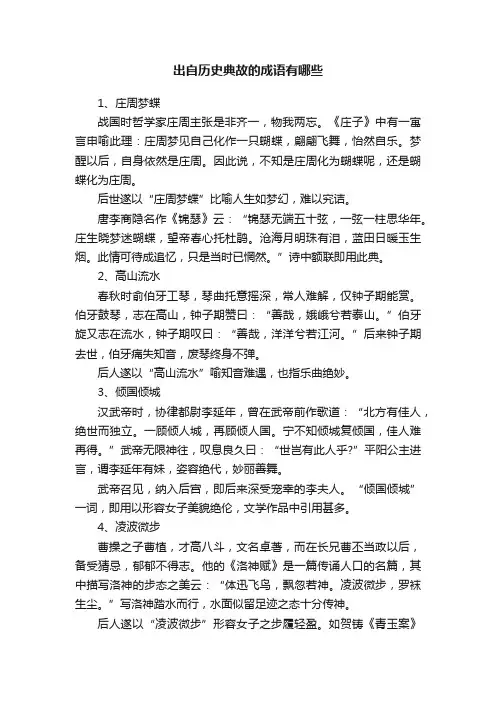
出自历史典故的成语有哪些1、庄周梦蝶战国时哲学家庄周主张是非齐一,物我两忘。
《庄子》中有一寓言申喻此理:庄周梦见自己化作一只蝴蝶,翩翩飞舞,怡然自乐。
梦醒以后,自身依然是庄周。
因此说,不知是庄周化为蝴蝶呢,还是蝴蝶化为庄周。
后世遂以“庄周梦蝶”比喻人生如梦幻,难以究诘。
唐李商隐名作《锦瑟》云:“锦瑟无端五十弦,一弦一柱思华年。
庄生晓梦迷蝴蝶,望帝春心托杜鹃。
沧海月明珠有泪,蓝田日暖玉生烟。
此情可待成追忆,只是当时已惘然。
”诗中额联即用此典。
2、高山流水春秋时俞伯牙工琴,琴曲托意摇深,常人难解,仅钟子期能赏。
伯牙鼓琴,志在高山,钟子期赞曰:“善哉,娥峨兮若泰山。
”伯牙旋又志在流水,钟子期叹曰:“善哉,洋洋兮若江河。
”后来钟子期去世,伯牙痛失知音,废琴终身不弹。
后人遂以“高山流水”喻知音难遇,也指乐曲绝妙。
3、倾国倾城汉武帝时,协律都尉李延年,曾在武帝前作歌道:“北方有佳人,绝世而独立。
一顾倾人城,再顾倾人国。
宁不知倾城复倾国,佳人难再得。
”武帝无限神往,叹息良久曰:“世岂有此人乎?”平阳公主进言,谓李延年有妹,姿容绝代,妙丽善舞。
武帝召见,纳入后宫,即后来深受宠幸的李夫人。
“倾国倾城”一词,即用以形容女子美貌绝伦,文学作品中引用甚多。
4、凌波微步曹操之子曹植,才高八斗,文名卓著,而在长兄曹丕当政以后,备受猜忌,郁郁不得志。
他的《洛神赋》是一篇传诵人口的名篇,其中描写洛神的步态之美云:“体迅飞鸟,飘忽若神。
凌波微步,罗袜生尘。
”写洛神踏水而行,水面似留足迹之态十分传神。
后人遂以“凌波微步”形容女子之步履轻盈。
如贺铸《青玉案》词“凌波不过横塘路,但目送,芳尘去”,即用此典。
(典见曹植《洛神赋》)。
5、破镜重圆南朝陈代子舍人徐德言,其妻为陈后主的妹妹乐昌公主。
因见天下大乱,国亡无日。
恐一旦亡国,离乱之际,夫妻失散,遂破铜镜为二,夫妻各执一半,相约他年正月十五日卖镜都市以谋晤合。
未几,陈果为隋所灭。
公主被隋朝重臣越国公杨素所获,极受恩宠。
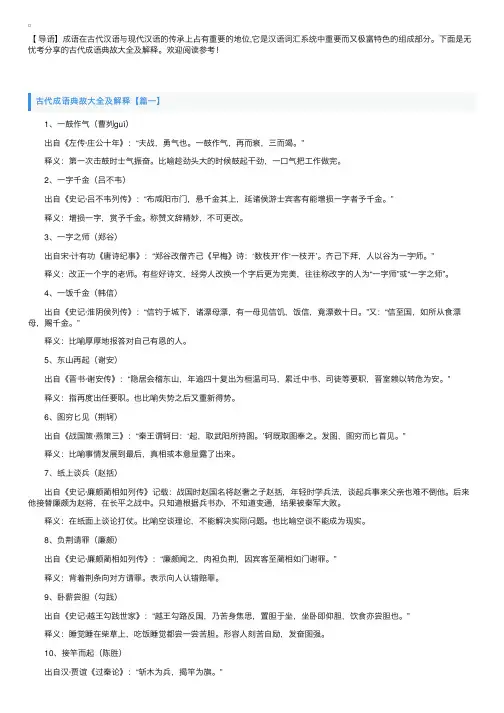
【导语】成语在古代汉语与现代汉语的传承上占有重要的地位,它是汉语词汇系统中重要⽽⼜极富特⾊的组成部分。
下⾯是⽆忧考分享的古代成语典故⼤全及解释。
欢迎阅读参考!古代成语典故⼤全及解释【篇⼀】 1、⼀⿎作⽓(曹刿guì) 出⾃《左传·庄公⼗年》:“夫战,勇⽓也。
⼀⿎作⽓,再⽽衰,三⽽竭。
” 释义:第⼀次击⿎时⼠⽓振奋。
⽐喻趁劲头⼤的时候⿎起⼲劲,⼀⼝⽓把⼯作做完。
2、⼀字千⾦(吕不韦) 出⾃《史记·吕不韦列传》:“布咸阳市门,悬千⾦其上,延诸侯游⼠宾客有能增损⼀字者予千⾦。
” 释义:增损⼀字,赏予千⾦。
称赞⽂辞精妙,不可更改。
3、⼀字之师(郑⾕) 出⾃宋·计有功《唐诗纪事》:“郑⾕改僧齐⼰《早梅》诗:‘数枝开’作‘⼀枝开’。
齐⼰下拜,⼈以⾕为⼀字师。
” 释义:改正⼀个字的⽼师。
有些好诗⽂,经旁⼈改换⼀个字后更为完美,往往称改字的⼈为“⼀字师”或“⼀字之师”。
4、⼀饭千⾦(韩信) 出⾃《史记·淮阴侯列传》:“信钓于城下,诸漂母漂,有⼀母见信饥,饭信,竟漂数⼗⽇。
”⼜:“信⾄国,如所从⾷漂母,赐千⾦。
” 释义:⽐喻厚厚地报答对⾃⼰有恩的⼈。
5、东⼭再起(谢安) 出⾃《晋书·谢安传》:“隐居会稽东⼭,年逾四⼗复出为桓温司马,累迁中书、司徒等要职,晋室赖以转危为安。
” 释义:指再度出任要职。
也⽐喻失势之后⼜重新得势。
6、图穷⼔见(荆轲) 出⾃《战国策·燕策三》:“秦王谓轲⽈:‘起,取武阳所持图。
’轲既取图奉之。
发图,图穷⽽⼔⾸见。
” 释义:⽐喻事情发展到最后,真相或本意显露了出来。
7、纸上谈兵(赵括) 出⾃《史记·廉颇蔺相如列传》记载:战国时赵国名将赵奢之⼦赵括,年轻时学兵法,谈起兵事来⽗亲也难不倒他。
后来他接替廉颇为赵将,在长平之战中。
只知道根据兵书办,不知道变通,结果被秦军⼤败。
释义:在纸⾯上谈论打仗。
⽐喻空谈理论,不能解决实际问题。
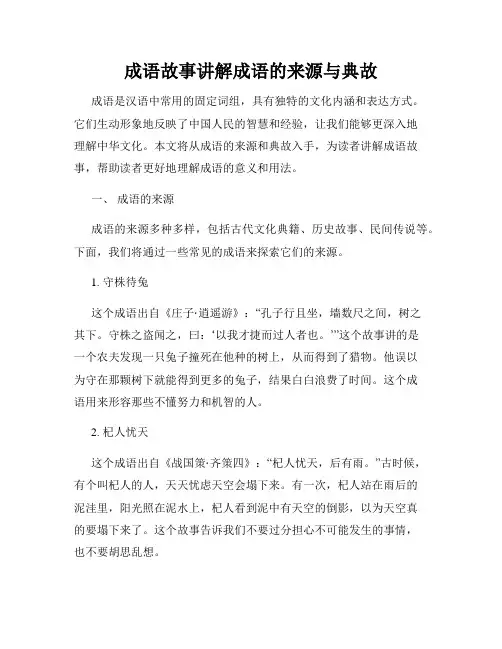
成语故事讲解成语的来源与典故成语是汉语中常用的固定词组,具有独特的文化内涵和表达方式。
它们生动形象地反映了中国人民的智慧和经验,让我们能够更深入地理解中华文化。
本文将从成语的来源和典故入手,为读者讲解成语故事,帮助读者更好地理解成语的意义和用法。
一、成语的来源成语的来源多种多样,包括古代文化典籍、历史故事、民间传说等。
下面,我们将通过一些常见的成语来探索它们的来源。
1. 守株待兔这个成语出自《庄子·逍遥游》:“孔子行且坐,墙数尺之间,树之其下。
守株之盗闻之,曰:‘以我才捷而过人者也。
’”这个故事讲的是一个农夫发现一只兔子撞死在他种的树上,从而得到了猎物。
他误以为守在那颗树下就能得到更多的兔子,结果白白浪费了时间。
这个成语用来形容那些不懂努力和机智的人。
2. 杞人忧天这个成语出自《战国策·齐策四》:“杞人忧天,后有雨。
”古时候,有个叫杞人的人,天天忧虑天空会塌下来。
有一次,杞人站在雨后的泥洼里,阳光照在泥水上,杞人看到泥中有天空的倒影,以为天空真的要塌下来了。
这个故事告诉我们不要过分担心不可能发生的事情,也不要胡思乱想。
3. 四面楚歌这个成语来源于战国时期楚汉相争的故事。
汉代时,刘邦率军进攻项羽,每战必胜,项羽最终被迫退守垓下。
当时,楚军四面受到围攻,处境非常艰难。
这个成语用来形容被敌人重重包围,孤立无援的处境。
二、成语的典故成语的典故是成语背后的故事,通过这些故事,我们能更好地理解成语的含义和用法。
下面,我们将为你讲解一些成语的典故。
1. 鸡犬不宁这个成语的典故出自《庄子·逍遥游》:“庄子之室也,有竹巢者,鸡为之跃,犬为之吠,主人怒曰:‘抱佛脚而来吾窃竹也。
’从竹右抱竹而左拥剑以守其室。
”庄子讲述了一个故事,说他家的鸡犬总是安静地呆着,但是有一天,它们突然鸡飞狗跳,发出了各种声音。
庄子的邻居误以为有人想偷庄子的东西,拿起武器去看守。
结果,他发现只是一阵风吹动了竹子,吓得鸡犬叫而已。
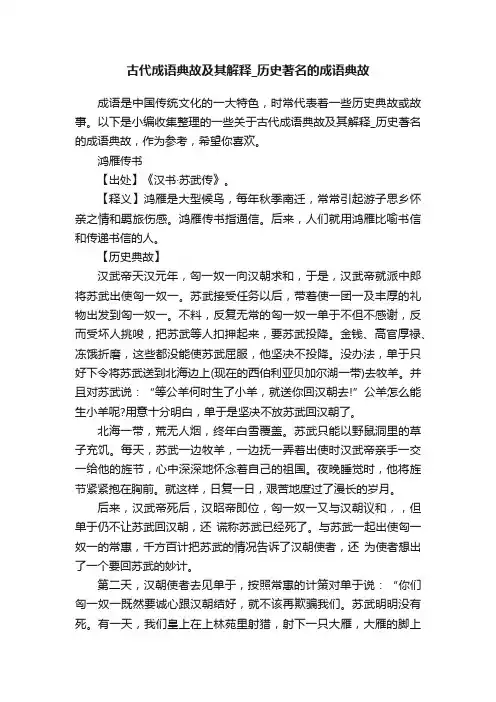
古代成语典故及其解释_历史著名的成语典故成语是中国传统文化的一大特色,时常代表着一些历史典故或故事。
以下是小编收集整理的一些关于古代成语典故及其解释_历史著名的成语典故,作为参考,希望你喜欢。
鸿雁传书【出处】《汉书·苏武传》。
【释义】鸿雁是大型候鸟,每年秋季南迁,常常引起游子思乡怀亲之情和羁旅伤感。
鸿雁传书指通信。
后来,人们就用鸿雁比喻书信和传递书信的人。
【历史典故】汉武帝天汉元年,匈一奴一向汉朝求和,于是,汉武帝就派中郎将苏武出使匈一奴一。
苏武接受任务以后,带着使一团一及丰厚的礼物出发到匈一奴一。
不料,反复无常的匈一奴一单于不但不感谢,反而受坏人挑唆,把苏武等人扣押起来,要苏武投降。
金钱、高官厚禄、冻饿折磨,这些都没能使苏武屈服,他坚决不投降。
没办法,单于只好下令将苏武送到北海边上(现在的西伯利亚贝加尔湖一带)去牧羊。
并且对苏武说:“等公羊何时生了小羊,就送你回汉朝去!”公羊怎么能生小羊呢?用意十分明白,单于是坚决不放苏武回汉朝了。
北海一带,荒无人烟,终年白雪覆盖。
苏武只能以野鼠洞里的草子充饥。
每天,苏武一边牧羊,一边抚一弄着出使时汉武帝亲手一交一给他的旌节,心中深深地怀念着自己的祖国。
夜晚睡觉时,他将旌节紧紧抱在胸前。
就这样,日复一日,艰苦地度过了漫长的岁月。
后来,汉武帝死后,汉昭帝即位,匈一奴一又与汉朝议和,,但单于仍不让苏武回汉朝,还谎称苏武已经死了。
与苏武一起出使匈一奴一的常惠,千方百计把苏武的情况告诉了汉朝使者,还为使者想出了一个要回苏武的妙计。
第二天,汉朝使者去见单于,按照常惠的计策对单于说:“你们匈一奴一既然要诚心跟汉朝结好,就不该再欺骗我们。
苏武明明没有死。
有一天,我们皇上在上林苑里射猎,射下一只大雁,大雁的脚上系着一条绸子,那是苏武写给皇上的一封信。
信里说他在寒冷的北海地方牧羊,你们怎么说他死了呢?大雁能带信,这是天意,你们怎么可以欺骗天呢?”单于听了,不觉大吃一惊,只好承认自己说了谎话,而后又说:“苏武的忠心都感动了飞鸟,难道我们还不如大雁吗?”说完,他立即向汉朝使者道歉,并答应赶快派人把苏武从北海地方找回来。
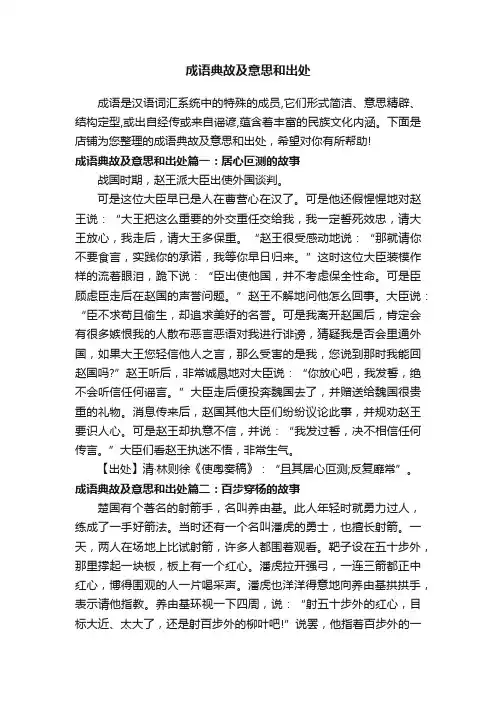
成语典故及意思和出处成语是汉语词汇系统中的特殊的成员,它们形式简洁、意思精辟、结构定型,或出自经传或来自谣谚,蕴含着丰富的民族文化内涵。
下面是店铺为您整理的成语典故及意思和出处,希望对你有所帮助!成语典故及意思和出处篇一:居心叵测的故事战国时期,赵王派大臣出使外国谈判。
可是这位大臣早已是人在曹营心在汉了。
可是他还假惺惺地对赵王说:“大王把这么重要的外交重任交给我,我一定誓死效忠,请大王放心,我走后,请大王多保重。
“赵王很受感动地说:“那就请你不要食言,实践你的承诺,我等你早日归来。
”这时这位大臣装模作样的流着眼泪,跪下说:“臣出使他国,并不考虑保全性命。
可是臣顾虑臣走后在赵国的声誉问题。
”赵王不解地问他怎么回事。
大臣说:“臣不求苟且偷生,却追求美好的名誉。
可是我离开赵国后,肯定会有很多嫉恨我的人散布恶言恶语对我进行诽谤,猜疑我是否会里通外国,如果大王您轻信他人之言,那么受害的是我,您说到那时我能回赵国吗?”赵王听后,非常诚恳地对大臣说:“你放心吧,我发誓,绝不会听信任何谣言。
”大臣走后便投奔魏国去了,并赠送给魏国很贵重的礼物。
消息传来后,赵国其他大臣们纷纷议论此事,并规劝赵王要识人心。
可是赵王却执意不信,并说:“我发过誓,决不相信任何传言。
”大臣们看赵王执迷不悟,非常生气。
【出处】清·林则徐《使粤奏稿》:“且其居心叵测;反复靡常”。
成语典故及意思和出处篇二:百步穿杨的故事楚国有个著名的射箭手,名叫养由基。
此人年轻时就勇力过人,练成了一手好箭法。
当时还有一个名叫潘虎的勇士,也擅长射箭。
一天,两人在场地上比试射箭,许多人都围着观看。
靶子设在五十步外,那里撑起一块板,板上有一个红心。
潘虎拉开强弓,一连三箭都正中红心,博得围观的人一片喝采声。
潘虎也洋洋得意地向养由基拱拱手,表示请他指教。
养由基环视一下四周,说:“射五十步外的红心,目标大近、太大了,还是射百步外的柳叶吧!”说罢,他指着百步外的一棵杨柳树,叫人在树上选一片叶子,涂上红色作为靶子。
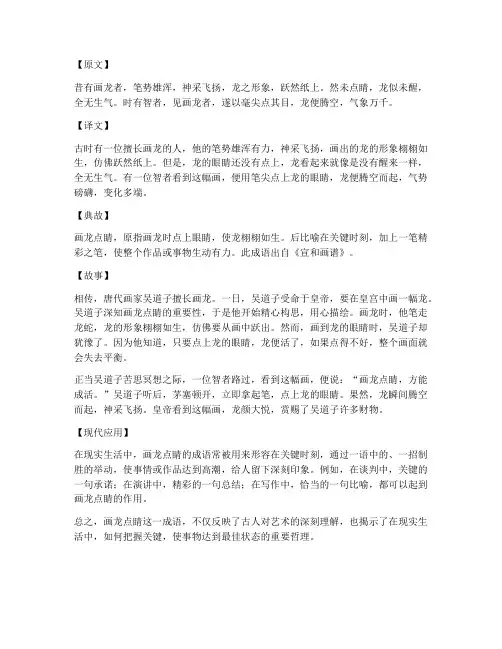
【原文】昔有画龙者,笔势雄浑,神采飞扬,龙之形象,跃然纸上。
然未点睛,龙似未醒,全无生气。
时有智者,见画龙者,遂以毫尖点其目,龙便腾空,气象万千。
【译文】古时有一位擅长画龙的人,他的笔势雄浑有力,神采飞扬,画出的龙的形象栩栩如生,仿佛跃然纸上。
但是,龙的眼睛还没有点上,龙看起来就像是没有醒来一样,全无生气。
有一位智者看到这幅画,便用笔尖点上龙的眼睛,龙便腾空而起,气势磅礴,变化多端。
【典故】画龙点睛,原指画龙时点上眼睛,使龙栩栩如生。
后比喻在关键时刻,加上一笔精彩之笔,使整个作品或事物生动有力。
此成语出自《宣和画谱》。
【故事】相传,唐代画家吴道子擅长画龙。
一日,吴道子受命于皇帝,要在皇宫中画一幅龙。
吴道子深知画龙点睛的重要性,于是他开始精心构思,用心描绘。
画龙时,他笔走龙蛇,龙的形象栩栩如生,仿佛要从画中跃出。
然而,画到龙的眼睛时,吴道子却犹豫了。
因为他知道,只要点上龙的眼睛,龙便活了,如果点得不好,整个画面就会失去平衡。
正当吴道子苦思冥想之际,一位智者路过,看到这幅画,便说:“画龙点睛,方能成活。
”吴道子听后,茅塞顿开,立即拿起笔,点上龙的眼睛。
果然,龙瞬间腾空而起,神采飞扬。
皇帝看到这幅画,龙颜大悦,赏赐了吴道子许多财物。
【现代应用】在现实生活中,画龙点睛的成语常被用来形容在关键时刻,通过一语中的、一招制胜的举动,使事情或作品达到高潮,给人留下深刻印象。
例如,在谈判中,关键的一句承诺;在演讲中,精彩的一句总结;在写作中,恰当的一句比喻,都可以起到画龙点睛的作用。
总之,画龙点睛这一成语,不仅反映了古人对艺术的深刻理解,也揭示了在现实生活中,如何把握关键,使事物达到最佳状态的重要哲理。
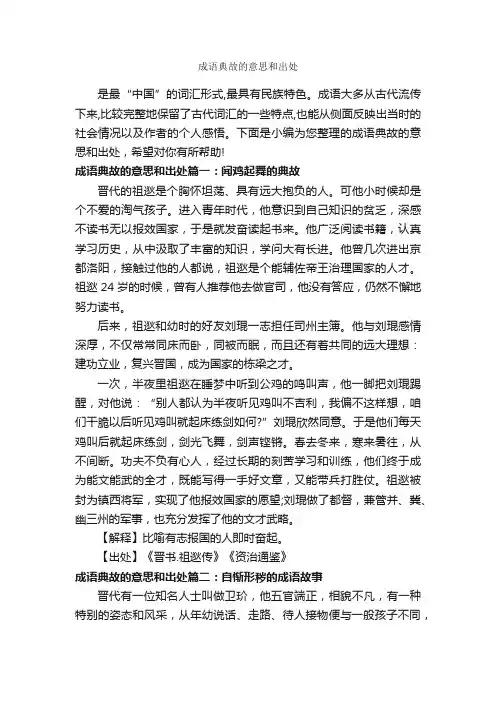
成语典故的意思和出处是最“中国”的词汇形式,最具有民族特色。
成语大多从古代流传下来,比较完整地保留了古代词汇的一些特点,也能从侧面反映出当时的社会情况以及作者的个人感悟。
下面是小编为您整理的成语典故的意思和出处,希望对你有所帮助!成语典故的意思和出处篇一:闻鸡起舞的典故晋代的祖逖是个胸怀坦荡、具有远大抱负的人。
可他小时候却是个不爱的淘气孩子。
进入青年时代,他意识到自己知识的贫乏,深感不读书无以报效国家,于是就发奋读起书来。
他广泛阅读书籍,认真学习历史,从中汲取了丰富的知识,学问大有长进。
他曾几次进出京都洛阳,接触过他的人都说,祖逖是个能辅佐帝王治理国家的人才。
祖逖24岁的时候,曾有人推荐他去做官司,他没有答应,仍然不懈地努力读书。
后来,祖逖和幼时的好友刘琨一志担任司州主簿。
他与刘琨感情深厚,不仅常常同床而卧,同被而眠,而且还有着共同的远大理想:建功立业,复兴晋国,成为国家的栋梁之才。
一次,半夜里祖逖在睡梦中听到公鸡的鸣叫声,他一脚把刘琨踢醒,对他说:“别人都认为半夜听见鸡叫不吉利,我偏不这样想,咱们干脆以后听见鸡叫就起床练剑如何?”刘琨欣然同意。
于是他们每天鸡叫后就起床练剑,剑光飞舞,剑声铿锵。
春去冬来,寒来暑往,从不间断。
功夫不负有心人,经过长期的刻苦学习和训练,他们终于成为能文能武的全才,既能写得一手好文章,又能带兵打胜仗。
祖逖被封为镇西将军,实现了他报效国家的愿望;刘琨做了都督,兼管并、冀、幽三州的军事,也充分发挥了他的文才武略。
【解释】比喻有志报国的人即时奋起。
【出处】《晋书.祖逖传》《资治通鉴》成语典故的意思和出处篇二:自惭形秽的成语故事晋代有一位知名人士叫做卫玠,他五官端正,相貌不凡,有一种特别的姿态和风采,从年幼说话、走路、待人接物便与一般孩子不同,人人见了都很喜爱。
有一天,母亲在给他梳头的时候说:“你是卫国第一美男子,随时都应该注意自己的仪态举止。
”卫玠惊愕地看着母亲,“我真的是卫国第一美男子?”母亲说:“你信的话,你出去问问其他人。
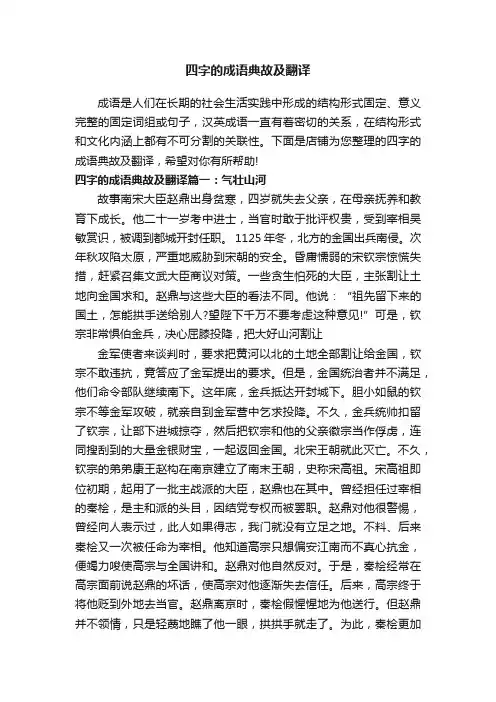
四字的成语典故及翻译成语是人们在长期的社会生活实践中形成的结构形式固定、意义完整的固定词组或句子,汉英成语一直有着密切的关系,在结构形式和文化内涵上都有不可分割的关联性。
下面是店铺为您整理的四字的成语典故及翻译,希望对你有所帮助!四字的成语典故及翻译篇一:气壮山河故事南宋大臣赵鼎出身贫寒,四岁就失去父亲,在母亲抚养和教育下成长。
他二十一岁考中进士,当官时敢于批评权贵,受到宰相吴敏赏识,被调到都城开封任职。
1125年冬,北方的金国出兵南侵。
次年秋攻陷太原,严重地威胁到宋朝的安全。
昏庸懦弱的宋钦宗惊慌失措,赶紧召集文武大臣商议对策。
一些贪生怕死的大臣,主张割让土地向金国求和。
赵鼎与这些大臣的看法不同。
他说:“祖先留下来的国土,怎能拱手送给别人?望陛下千万不要考虑这种意见!”可是,钦宗非常惧伯金兵,决心屈膝投降,把大好山河割让金军使者来谈判时,要求把黄河以北的土地全部割让给金国,钦宗不敢违抗,竟答应了金军提出的要求。
但是,金国统治者并不满足,他们命令部队继续南下。
这年底,金兵抵达开封城下。
胆小如鼠的钦宗不等金军攻破,就亲自到金军营中乞求投降。
不久,金兵统帅扣留了钦宗,让部下进城掠夺,然后把钦宗和他的父亲徽宗当作俘虏,连同搜刮到的大量金银财宝,一起返回金国。
北宋王朝就此灭亡。
不久,钦宗的弟弟康王赵构在南京建立了南末王朝,史称宋高祖。
宋高祖即位初期,起用了一批主战派的大臣,赵鼎也在其中。
曾经担任过宰相的秦桧,是主和派的头目,因结党专权而被罢职。
赵鼎对他很警惕,曾经向人表示过,此人如果得志,我门就没有立足之地。
不料、后来秦桧又一次被任命为宰相。
他知道高宗只想偏安江南而不真心抗金,便竭力唆使高宗与全国讲和。
赵鼎对他自然反对。
于是,秦桧经常在高宗面前说赵鼎的坏话,使高宗对他逐渐失去信任。
后来,高宗终于将他贬到外地去当官。
赵鼎离京时,秦桧假惺惺地为他送行。
但赵鼎并不领情,只是轻蔑地瞧了他一眼,拱拱手就走了。
为此,秦桧更加忌恨赵鼎,将他越调越远,最后贬谪到朱崖。
成语的来源与解释简介:成语作为汉语的精华之一,集中了中国古代文化、历史和智慧的结晶。
它们由独特的来源和意义组成,既能够丰富语言,又能够传递深刻的哲理和道德教诲。
本文将探讨成语的来源和解释,以展示这些富有历史和文化内涵的语言珍品。
一、成语的来源成语的来源多种多样,包括神话传说、历史典故、文学作品以及民间传说等。
下面将详细介绍成语来源的几种常见类型:1. 神话传说很多成语的来源可以追溯到中国的神话传说。
例如,成语“井底之蛙”的出处就来自于《庄子·秋水》这个神话故事。
在这个故事中,蛙儿生活在井底,对外界一无所知,因此成语“井底之蛙”用来形容见识狭窄、缺乏见多识广的人。
2. 历史典故历史典故是成语来源的另一个重要渊源。
许多成语通过描述历史上的事件或人物来传达特定的含义。
例如,“画蛇添足”这个成语的来源可以追溯到战国时期的楚国。
据说,楚国有个画师非常擅长画蛇,但他却在画蛇的画上添了一对脚,这被认为是画蛇添足,成语就因此而来。
3. 文学作品文学作品是成语源头的重要来源之一。
很多成语来自于古代文人的作品,如诗词、小说等。
以“纸上谈兵”为例,出自明代小说《西游记》,形容只会空谈而不实际动手的人。
4. 民间传说民间传说也贡献了许多成语的诞生。
民间的神怪故事和传说经常成为成语的来源。
比如,“卧薪尝胆”这个成语来自于战国时期的一个故事,讲述了楚国人范蠡卧薪尝胆,表示坚定决心要复国。
二、成语的解释成语的解释是理解和运用成语的重要基础。
下面将对成语的解释给予一些例子和细致的分析:1. 成语的字面意义成语的字面意义通常是由其组成的字所决定的。
例如,“闭门造车”这个成语字面上是指在门里造车,但实际上意指自己闭门造车,孤立无助,缺乏经验和外界的帮助。
2. 成语的引申意义很多成语有着丰富的引申意义,超越了字面上的意义。
例如,“一箭双雕”这个成语原本是指一箭射中两只雕,后来引申为在一次行动中达到两个目标,具有极高的效率和成果。
成语典故的意思和出处成语典故的意思和出处导语:成语典故指关于成语产生、形成、流传的故事传说。
成语有很大一部分是从古代相承沿用下来的,它既代表了一个故事典故,又是一种现成的话,很多又有比喻引申意义而被广泛引用。
下面是小编为大家精心收集整理的成语典故,希望能帮助到大家!1 人日鸟南唐王建封,粗鄙无文,而喜附庸风雅。
其族子自他人处得《动植疏》一篇,文中讲述经营花草鸟之事。
王建封见而喜之,请人抄录一份。
文中有涉及养鸽一段文字,因抄手誊写错误,将“鸽”字分拆成三,讹作“人”、“日”、“ 鸟”。
王建封不辨正误,以为”人日鸟”即鸽之称。
古来风俗,正月初七为人日。
后凡人日宴客时,王建封必在席上具烧鸽一味,盖以人日食“人日鸟”,恰合节令时宜。
时人引为笑谈。
后因以“人日鸟”比喻无知无识而强作解人。
(典见《清异录》)2 曲高和寡战国末,宋玉为楚襄王文学侍臣,为人毁谤。
楚襄王问道:“先生难道有行为不检点之处吗?何以旁人颇多议论呢?”宋玉答道:“有人在国都唱歌,开始唱俗曲《下里》、《巴人》,都城中应和者数千人;再唱高深一点的《阳阿》、《薤露》,都城中应和者数百人;到唱更高深的《阳春》、《白雪》时,都城中应和者不过数十人;乃至唱最高深最美妙的歌曲时,都城中应和者仅数人而已。
所以曲越高和者越少。
”后世因以“曲高和寡”比喻言行、作品高超,知音难得或难以企及。
如三国魏阮瑀《筝赋》:“曲高和寡,妙伎难工。
”而“阳春白雪”也成了高雅作品的代称。
(典见宋玉《对楚王问》)3 斗酒学士初唐诗人王绩,隋大业间举孝廉,唐朝建国后,王绩应高祖征招,待诏于门下省。
旧例,待诏每日官府供酒三升。
王绩性嗜酒,语其弟王静曰:“待诏虽俸薄,便三升好酒可恋。
”侍中陈叔达得悉后,破例将王绩的酒增为每日一斗。
王绩遂得”斗酒学士”之称。
(典见《东皋子集?序》《新唐书》本传、《唐才子传》)4 嘲风咏月“嘲风咏月”指专写风花雪月、内容贫乏之作。
唐白居易《与元九书》:“至于梁、陈间,率不过嘲风雪、弄花草而已。
成语典故解释加出处是语言外事实的一种反映形式,通过具体的表达抽象的,通过可感觉、可触摸的表达无形的。
下面是小编为您整理的成语典故解释加出处,希望对你有所帮助!成语典故解释加出处篇一:万死不辞的故事东汉末年,朝政大权落在董卓手中。
董卓骄横跋扈,出入宫廷用皇帝的仪仗,并让弟弟、侄儿统率禁军,把董氏宗族的人不论老小一律封为列侯。
他还征二十五万民夫为自己修筑宫室,又从民间选来八百美女,纳入宫内。
司徒王允见董卓如此嚣张,很为汉玉室担心,但又无法除掉董卓,心中十分烦恼。
一天夜里,他到后花园散心,忽然听见有人在牡丹亭畔长吁短叹。
走近一看,原来是家中的歌妓貂蝉。
王允问道:“深更半夜,你为什么来这里唉声叹气?”貂蝉回答说:“承蒙大人恩惠抚养,为我训习歌舞,并以礼相待。
我虽然粉身碎骨,也不能报答万一。
近来见大人双眉紧锁,知道必定是为国事操心,所以心中忧伤,但不敢询问。
今晚又见大人行坐不安,因此也长吁短叹起来,想不到被大人发现。
如果大人有用我的地方,我一定效力,虽万死也决不推辞。
”王允听了貂蝉的话,忽然灵机一动,计上心来,马上朝貂蝉跪下,纳头便拜。
貂蝉慌忙扶起。
王允流着眼泪说:“眼下朝廷危如累卵,贼臣董卓将要篡位,朝中文武元计可施。
董卓有一个义子吕布,骁勇异常,天下无有敌手。
方才听了你的话,我想出一条‘连环计’来,先把你许配给吕布,然后再暗中献给董卓。
你去离间他们父子两人,让他们因为想得到你而互相仇恨,最后挑拨吕布去杀死董卓。
如此方能除掉大害,为国效忠。
不知你意下如何?”貂蝉缓缓站起,态度坚决他说:“我已许下大人虽万死也决不推辞,如果不能遵计杀死董卓,以报国恩,愿意死在万刃之下!”玉允和貂蝉共同谋划,实现了“连环计”,结果除掉了奸臣董卓。
【出处】明·罗贯中《三国演义》:“吾见兄长一面;虽万死不辞。
”【解释】万死:死一万次,形容冒危险。
死一万次也不推辞。
表示愿意拼死效劳。
成语典故解释加出处篇二:千载难逢的故事唐代著名的文学家韩愈,小时候就成为孤儿由他的嫂子抚养。
介绍成语的来源与汉译所谓典故性成语,指的是出自历史事件、寓言、神话、传说等一类的成语。
其特点是源远流长,富含较浓厚的民族色彩,广为民间使用,约定俗成。
如果说多以词、词组、句子形式出现是语言的结构特征,那么作为语言一分支的典故性成语多以词组形式而很少以句子形式出现。
它虽然结构简单,但内容丰富,意义精深。
其形式的固定性、意义的整体性表明不可随意改变它的结构,也不可随便将其中的各词分割开来。
如cat's paw,可谓最简单不过的了,但又绝非杜撰和臆造,而是出自法国拉丰丹的一则寓言故事,讲一只猴子利用猫为其从火中取栗子。
在现实生活中则常用来指被别人当作工具或爪牙利用的人。
又如no respecter of persons在用字方面也可谓比较简单,它出自《新约使徒行传》第十章:"Then Peter opened his mouth,and said,of a truth I perceive that God is no respecter of persons,"原指上帝"不偏待人",如今该成语在本义的基础上暗含"歧视"之义,然而在不民的语境中效果却不一样。
GoDoHoCole曾在"Practical Economics"中用此成语来说明墨索里尼"不偏待人",其实是对他的讽刺。
如果能将此类成语运用得恰到好处,就会使文章、演说等大为增色,从而说明深刻的道理,使人受到深刻的教育。
下面拟就典故性成语的来源与汉译作下探讨:一、源于历史故事或历史事件。
二、源于寓言故事。
寓言是用比喻的形式说明一定的道理,是文学作品中最为短小精练的一种形式。
如kill the goose to get the eggs,源于希腊寓言,说的是曾有一个乡下人,因为发财心切杀死了自己饲养的那只能下金蛋的鹅,以为如此就可一次获得全部想象中的金块,但其结果一无所获。
历史典故的成语及出处指鹿为马秦二世时,丞相赵高野心勃勃,日夜盘算着要篡夺皇位。
可朝中大臣有多少人能听他摆布,有多少人反对他,他心中没底。
于是,他想了一个办法,准备试一试自己的威信,同时也可以摸清敢于反对他的人。
一天上朝时,赵高让人牵来一只鹿,满脸堆笑地对秦二世说:“陛下,我献给您一匹好马。
”秦二世一看,心想:这哪里吗,这分明是一只鹿嘛!便笑着对赵高说:“丞相搞错了,这里是一只鹿,你怎么说是马呢?"赵高面不改色心不慌地说:“请陛下看清楚了, 这的的确确是一匹千里好马。
"秦二世又看了看那只鹿,将信将疑地说: "马的头上怎么会长角呢?”赵高一看时机到了,转过身,用手指着众大臣们,大声说:“陛下如果不信我的话,可以问问众位大臣。
”大臣们都被赵高的一派胡言搞得不知所措,私下里嘀咕:这个赵高搞什么名堂?是鹿是马这不是明摆着吗!当看到赵高脸上露出阴险的笑容,两只眼睛骨碌碌地轮流盯着每个人的时候,大臣们忽然明的他的用意。
一些胆小又有正义感的人都低下头 ,不敢说话,因为说假话,对不起自己的良心,说真话又怕日后被赵高所害。
有些正直的人,坚持认为是鹿而不是马。
还有一些平时就紧跟赵高的奸佞之人立刻表示拥护赵高的说法,对皇上说,“这的确是一匹千里马!”事后,赵高通过各种手段把那些不顺从自己的正直大臣纷纷治罪,甚至满门抄斩。
草木皆兵公元383年,前秦苻坚出兵攻晋,前锋在安徽寿春洛涧被晋军打败。
苻坚登寿春城嘹望,看到兵布阵严整,又望见八公山上的草木,以为都是晋兵,认为遇到了劲敌,因而感到害怕。
后来就用草木皆兵形容神经过敏、疑神疑鬼的惊恐心理。
完璧归赵战国时代赵国得到了楚国的和氏璧,秦昭王要用十五座城池来换璧。
赵王派蔺相如带着璧去换城。
相如到秦国献了璧,见秦王没有诚意,不肯交出城池,就设法把璧弄回,派人送回赵国。
比喻原物完整无损地归还本人。
来源于历史故事的成语解释历史故事是历史长河中的一个加工后的横截面,有助于全面了解历史。
今天小编在这给大家整理了来源于历史故事的成语,接下来随着小编一起来看看吧!来源于历史故事的成语(一)【飘风苦雨】是什么意思?形容天气恶劣。
【飘风苦雨】出自哪里?战国·宋·墨翟《墨子·尚同上》:“今若天飘风苦雨,溱溱而至者,此天之所以罚百姓之不上同于天者也。
”【飘风苦雨】词语辨析:【飘风苦雨读音】:piāo fēng kǔ yǔ【飘风苦雨的近义词】:狂风暴雨、狂风怒号、狂风骤雨、大雨倾盆。
【飘风苦雨的反义词】:风和日丽、春暖花开。
【飘风苦雨用法】:作宾语、定语;用于书面语。
【飘风苦雨】如何造句:1、去汉中市第四中学的公车上,士鑫哥哥给姿懿和紫迎介绍了“飘风苦雨”的成语典故。
2、没想到刚一出门就遇到了飘风苦雨的天气。
来源于历史故事的成语(二)【一木难支】故事的主人公:袁粲(420-477年),初名愍孙,南朝宋大臣,太尉袁淑侄子。
少孤好学,颇有清才。
【一木难支】是什么意思?大楼将要倒塌,不是一根木头能够支撑得住的。
比喻一个人的力量单薄,维持不住全局。
【一木难支】出处南朝宋·刘义庆《世说新语·任诞》:“扞和峤呴曰:‘元裒如北厦门,拉攞自欲坏,非一木所能支。
’”隋·王通《文中子·事君》:“大厦将颠,非一木所支也。
”唐·白居易《白氏长庆集·卷十三·代书诗一百韵寄微之》诗:"千钧势易压,一柱力难支。
“【一木难支】词语辨析:【一木难支读音】:yī mù nán zhī【一木难支的近义词】:孤木难支【一木难支的反义词】:众志成城、众擎易举【一木难支用法】:作定语、状语;用于书面语【一木难支】典故南北朝宋顺帝的时候,萧道成把持政权,杀害忠良,横行恣肆,大有篡夺王室的企图。
当时大臣袁粲和齐东两人,秘密商量要杀死萧道成,但事机不密,反被萧道成的同党褚渊知道了,把秘密告诉萧道成。
Money makes the mare go.有钱能使鬼推磨Money is not everything, but without money you can't do anything.钞票不是万能的,但没有钱是万万不能的.time is money时间就是金钱With money, you can buy medicine but not health, room but not warmness, dressing but not beauty,marriage but not happiness.金钱可以买药品但不能买来健康,可以买房子但不能买来温馨,可以买服装但买不到美丽,可以促成婚姻但不能买来幸福.Time is money.时间就是金钱。
Money is the root of all evils.金钱是万恶之源。
You lend money to a person, he may becomes your friend, when you dun for it,he may becomes your enemy.借钱给一个人,他会成为你的朋友,但你讨债时,他会成为你的敌人。
所谓典故性成语,指的是出自历史事件、寓言、神话、传说等一类的成语。
其特点是源远流长,富含较浓厚的民族色彩,广为民间使用,约定俗成。
如果说多以词、词组、句子形式出现是语言的结构特征,那么作为语言一分支的典故性成语多以词组形式而很少以句子形式出现。
它虽然结构简单,但内容丰富,意义精深。
其形式的固定性、意义的整体性表明不可随意改变它的结构,也不可随便将其中的各词分割开来。
如cat's paw,可谓最简单不过的了,但又绝非杜撰和臆造,而是出自法国拉丰丹的一则寓言故事,讲一只猴子利用猫为其从火中取栗子。
在现实生活中则常用来指被别人当作工具或爪牙利用的人。
又如no respecter of persons在用字方面也可谓比较简单,它出自《新约·使徒行传》第十章:“Then Peter opened his mouth,and said,of a truth I perceive that God is no respecter of persons,”原指上帝“不偏待人”,如今该成语在本义的基础上暗含“歧视”之义,然而在不民的语境中效果却不一样。
G·D·H·Cole曾在“Practical Economics”中用此成语来说明墨索里尼“不偏待人”,其实是对他的讽刺。
如果能将此类成语运用得恰到好处,就会使文章、演说等大为增色,从而说明深刻的道理,使人受到深刻的教育。
下面拟就典故性成语的来源与汉译作下探讨:一、源于历史故事或历史事件。
历史上出现过众多的著名历史故事或事件,后人常用一简洁说法表达其内容,沿用久了就成了成语。
如Sword damocles出自古代希腊的一则历史故事。
业通古希腊历史、文学的罗马杰出作家与政论家西塞罗(106BC?3BC)在其论文《图斯库拉的谈话》中写道:“纪元前4世纪西西里岛上叙拉古的统治者狄奥尼修斯一世(406BC?67BC)有个亲信的佞叫达摩克里斯,他很羡慕帝王的豪华生活,常说:“君王是人世间最幸福的人”。
狄奥尼修斯为了教训这个想得君位者,在一次宴会上,要他坐在国王的宝座上,当他猛然抬头,只见头顶上有一把用头发悬着的宝剑,随时都刺到头顶的危险。
他吓得战战兢兢,如坐针毡,时刻提心吊胆,惶惶不安。
由此便产生了“达摩克里斯的宝剑”这个成语,它被用来比喻临头的危险或情况的危急,类似于汉语的“千钧一发”。
又如burn one‟s boats(bridges),此成语中的bridges为美国人所使用,原指古罗马朱力斯·凯撒大军乘船越过Rubicon后就把船烧了,以此向士兵指明后路已断,不可能后退。
现借用来比喻“不留后路,下定决心干到底”,同汉语的“破釜沉舟“。
二、源于寓言故事。
寓言是用比喻的形式说明一定的道理,是文学作品中最为短小精练的一种形式。
如kill the goose to get the eggs,源于希腊寓言,说的是曾有一个乡下人,因为发财心切杀死了自己饲养的那只能下金蛋的鹅,以为如此就可一次获得全部想象中的金块,但其结果一无所获。
现借比喻只贪图眼前利益,没有长远打算。
但汉语中不说“杀鹅取卵”而说“杀鸡取卵”,喻体不同,因此汉译时须遵循汉语成语的搭配规律。
又如Veper and File出自《伊索寓言》,说的是一条蝰蛇(Viper)发现一把铁锉(File),以为是一顿美餐。
但铁锉说,它的天职是咬别人,而不是被别人咬。
后人借此比喻“骗人者反受人骗”,汉译时要作直译或意译处理。
三、源于神话故事。
神话是关于神仙或神化的古代英雄的故事,是古代人们对自然现象和社会生活的一种天真的解释和美好向往。
如rain cats and dogs,源于北欧神话,猫对天气有很大影响,英国水手至今说:“猫尾巴藏大风”。
据说驾暴风雨的巫士化为猫形。
狗是风的信号,狗和狼都是暴风雨神奥丁的随从。
在德国古画中,风被画成狗头和狼头。
因此,猫被年作暴雨的象征,狗是伴随暴雨的强风,to rain cats and dogs 就是to rain heavily/hard,汉译便为“下倾盆大到雨”。
又如Analthea's horn,汉译常为“丰饶的羊角”。
阿玛尔忒亚(Amalthea),希腊祖籍中一神女,是宙斯(Zeus为主神,相当于罗马神话中的朱庇特Jupiter)的保姆。
婴儿时宙斯由神女阿玛尔忒亚喂以羊乳。
为了感思,宙斯敲下一羊角送给她。
许诺让羊角主人永远丰饶。
四、传说。
传说指的是人们口头流传下来的关于某人某事的叙述。
如swan song,据传说,音乐之神阿波罗(Apollo)的灵魂进入了一只天鹅,由此产生了毕达哥斯寓言:所有杰出诗人的灵魂都进入天鹅体内。
另据相传天鹅(swan)在临终前唱的歌最优美动听。
后人就用swan song来比喻诗人、作曲家、演员等的“最后作品”,这也是其汉译形式。
又如Leave no stone unturned,相传公元前447年波斯奖军马多尼奥斯在希腊的普拉蒂亚兵败被杀后,留下一大批财宝在军帐里。
底比斯的波利克拉特斯搜寻却一无所获,请示德尔斐神谕后知道要“翻转所有的石头”,最后找到了财宝。
现借此比喻想方设法等,汉译为“千方百计,想尽办法”。
五、源于民间飞俗。
如a bird of ill omen,源出古代占卜风俗,延至今日,猫头鹰、鹳则被视为吉祥鸟)。
渡鸟嗅觉灵敏,能确定远方死尸和腐尸地点。
因此渡鸟象征死亡。
猫头鹰在恶劣天气来临之前喊叫,而坏天气常带来疾病,故猫头鹰被视为丧鸟,阴森之鸟。
后人以此比喻“不吉利的人,常带来不幸消息的人”,汉译也是如此。
又如a feather in your cap,汉译为“值得荣耀的事、荣誉”。
源于广泛流行于亚洲和美洲印第安人当中的一种风俗:每杀死一个敌人就在头饰或帽子上加插一根羽毛。
古代吕西亚人和许多其他古人也有类似风俗,均以此来显示战绩与荣誉。
六、源于谚语。
谚语是在人闪中间流传的固定语句,用简单通俗的话反映出深刻的道理,是社会生活经验的总结。
如birds of a feather棾鲎匝栌顱birds of a feather flock together.即“物以类聚,人以群分”,转义为“一丘之貉”。
在《鲁迅全集》中有这样一句:“增加混乱的倒是有些悲观论者……将一切作者诋为…一丘之貉‟”。
其英译为In fact it is these pessimists who increase the chaos by…considering all writers birds of a feather.又如early bird,其汉泽为“早起者,早到的人”,源出谚语The early bird gets/catches the worm.意为“捷足先登(得),先下手为强”。
比较First come,first served.意指“先到的先招待”,与前一个有所不同。
七、源于某些作品。
英语中有较好的成语出自某些作品,有的是原封未动的摘引,有的是节缩而成。
如wash one‟s hands of a thing,可译为“洗手不干……;与……断绝关系”。
出自《马太福音》,犹太巡抚彼拉多主持审判耶稣,由于他判定耶稣无罪,一些犹太人不服,因此他当众宣布洗耳恭听手辞职并交出了耶稣,以示自己与此案无关。
又如as significant as the shake of Lord Burleigh‟s head,其汉译为“象拍利勋爵晃脑袋般意味深长”。
出自爱尔兰剧作家及政治家谢尼丹在《评论家》中的一幕模拟悲剧《西班牙无敌舰队》。
伯利勋爵埋头于国事,日理万机,忙得边说话的时间都没有,靠晃脑袋表达思想。
普夫则根据这个晃动解释他所表示的意思。
八、源于动物、植物、生活用品、人名、地名等。
如:⑴shed crocodile tears,据西方古代传说,鳄鱼吃人畜,一边吃,一边掉眼泪,比喻坏人假装同情被害者。
类似于汉语“猫哭老鼠,假慈悲”,且人们常采用此语的前一部分作为其汉译。
例如All your piteous words for the tenants are no more than crocodile tears.其汉译为“你这些怜惜佃户的话,都是猫哭老鼠”。
⑵the apple of discord,其汉译为“争斗的原因或根源”。
传说厄里斯女神未被邀请参加Thetis和Peleus的婚礼,她就把苹果扔有参加婚礼的神与神中间。
特洛伊王子帕里斯把它给了三个女神中最漂亮的维纳斯。
这就间接地引起了古希腊人和特洛伊人之间的特洛伊战争。
⑶Simon Legree,此人是美国女作家斯陀夫人所著《汤姆大伯的小屋》一书中管黑奴的工头,此人既尖酸刻薄,又好吹毛求疵。
其汉译为“尖酸刻薄、好吹毛求疵的人”。
⑷being Burke,其汉译为“出身名门,贵族门第”。
源于编纂《贵族人名录》作者爱尔兰人约翰·伯克(John Burke)之名,该《人名录》自1826年以来一直被公认是研究英国贵族阶级及其家谱的权威著作。
故列入伯克氏贵族人名录即为贵族出身。
⑸all Dutch/Greek to me,其汉译为“一窍不通”,其中Dutch与Greek原为“荷兰语”和“希腊语”。
⑹have the free-simpleof May Fair,其汉译为“不受出身等限制无条件继承取得的不动产”,其中May Fair乃“伦敦西区贵族住宅区”,十八世纪时该地区每年五月均有集市,因而得名。
⑺Life is but an empty dream,其汉译为“人生如梦”。